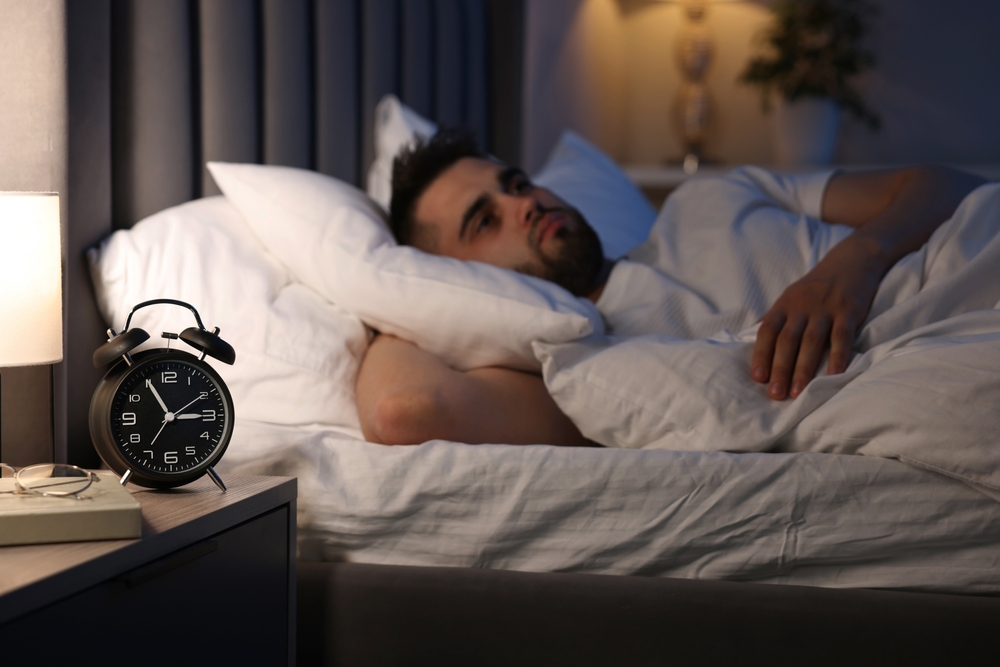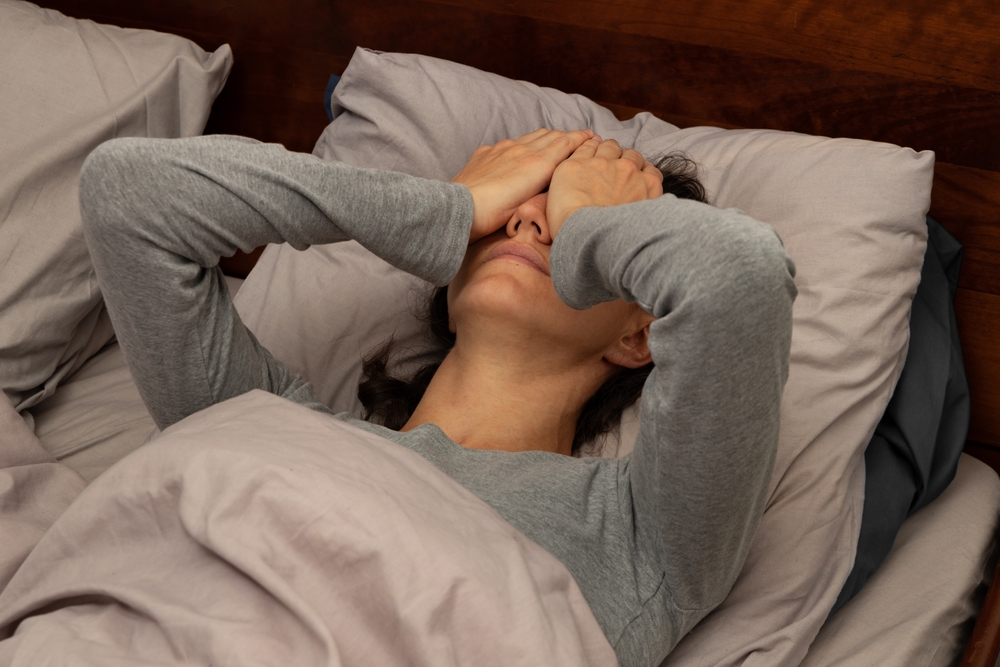Last Updated:
May 27th, 2025
Insomnia and Addiction | Symptoms and Support Options
What is insomnia?
Insomnia is a persistent difficulty with falling asleep, staying asleep or waking up too early and being unable to go back to sleep, despite having the opportunity to rest. While everyone experiences a bad night’s sleep now and then, insomnia is a pattern that disrupts sleep over time and affects daily life.
According to the Diagnostic and Statistical Manual of Mental Disorders (DSM-5-TR), insomnia disorder is diagnosed when sleep difficulties occur at least three nights per week for three months or more, causing distress or impairment in areas like work, relationships or overall well-being. Another sleep disorder, substance use or a medical or mental health condition does not explain it.
Insomnia can be short-term, often triggered by stress or life changes or chronic, lasting for months or even years.

Are there different types of insomnia?
Many people associate insomnia with simply not being able to sleep, and while that’s true, there’s more to the sleep condition. Insomnia comes in different forms, each affecting sleep patterns in a unique way. Understanding the type of insomnia a person is experiencing can help in finding the right approach to improve sleep.
Is there a link between addiction and insomnia?
The connection between addiction and insomnia is undeniable, but understanding how they influence each other can be challenging. Addiction can lead to persistent sleep issues, just as chronic insomnia can increase the risk of substance dependence. To get a clearer picture of this relationship, it is important to explore both sides: how addiction can trigger insomnia and how insomnia can drive addiction.
Below, we take a closer look at how these two conditions intertwine.
Already present addictions leading to insomnia
The link between addiction and insomnia has been widely researched, particularly during the detox stage of addiction recovery.
A study found that 66.5% of patients undergoing detoxification reported insomnia symptoms, indicating a strong link between substance use disorders (SUD) and sleep disturbances. Insomnia symptoms were highly prevalent among those actively withdrawing from substances, with 84.3% of patients reporting prior insomnia during active substance use.
Different types of insomnia were associated with different substances:
- Sleep-maintenance insomnia was most common overall (45.1% of patients).
- Alcohol use disorder was linked to higher rates of sleep-onset insomnia (44.7%), early morning awakening (45.4%) and poor sleep quality (44.2%).
- Cocaine use disorder had a high prevalence of sleep-maintenance insomnia (37.5%) and poor sleep quality (57.7%).
- Heroin use disorder was strongly associated with sleep-maintenance insomnia (21.2%).
- Cannabis use disorder had a higher prevalence of sleep-onset insomnia (14.1%).
- Benzodiazepine use disorder showed increased rates of sleep-maintenance insomnia (8.3%) and early awakening (8.2%).

The study concluded that insomnia symptoms are common during withdrawal, especially among those with more severe addiction histories. Insomnia also poses a risk for early relapse, making it a crucial issue to address in addiction treatment.
Already present insomnia leading to addiction
Research has shown a direct relationship between insomnia and an increased risk of substance use in both adolescents and adults. Insufficient sleep has been identified as a major predictor of future drug use and related problems, reinforcing the critical role of sleep health in addiction prevention.
- A study found that adolescents with insomnia were more likely to use alcohol, cannabis and other drugs within a 6- to 7-year follow-up period.
- Among university students, insomnia symptoms have been linked to problematic drug use.
- In adults, an insomnia diagnosis has been associated with a higher likelihood of alcohol use the following year, as well as an increased risk of illicit substance use disorder and nicotine dependence.
- Insomnia also moderates drug-related problems, amplifying aggression associated with cocaine use and worsening alcohol-related consequences such as public embarrassment, unintended drinking and passing out.
These findings highlight the strong connection between poor sleep and substance use, emphasising the need to address insomnia as part of addiction prevention and treatment strategies.
How are insomnia and addiction treated in rehab?
Rehab programmes take a comprehensive approach to treating both insomnia and addiction by addressing them together rather than as separate issues. Since substance use and sleep disturbances are closely linked, treating one without the other can make recovery more difficult.
Here’s how most rehab centres are structured:
Detox
The first step is often detox, where the body clears the addictive substance. Withdrawal symptoms, including insomnia, can be intense during this stage, so medical teams monitor sleep patterns and provide support through structured sleep schedules, relaxation techniques and, in some cases, temporary sleep aids.
Therapy
After detox, therapy plays a key role in breaking the cycle of addiction and sleep disruption. Many rehab centres use Cognitive Behavioural Therapy for Insomnia (CBT-i) alongside addiction therapy. CBT-i helps rewire negative sleep habits, while traditional addiction therapies like Cognitive Behavioural Therapy (CBT) and Dialectical Behavioural Therapy (DBT) address the underlying reasons for substance use.
Together, these therapies help individuals develop healthier coping mechanisms that don’t rely on substances to regulate emotions or sleep.
Holistic therapies such as yoga, meditation and guided relaxation exercises further support recovery by reducing stress and restoring the body’s natural sleep cycle.
Aftercare
Aftercare is essential in maintaining both addiction recovery and sleep health. Ongoing group therapy, relapse prevention strategies and support networks ensure that individuals continue practising what they’ve learned in rehab, reinforcing both sobriety and a stable sleep routine for long-term recovery.
What are the next steps?
If insomnia and addiction are affecting your life, help is available. Struggling with both can feel overwhelming, but the right support can make all the difference. Contact Addiction Helper today to explore treatment options and take the first step toward recovery and restful sleep.
Our compassionate team are ready and available to take your call, and guide you towards lasting the lasting addiction recovery you deserve.
Frequently Asked Questions
(Click here to see works cited)
-
- Grau-López L, Grau-López L, Daigre C, Palma-Álvarez RF, Martínez-Luna N, Ros-Cucurull E, Ramos-Quiroga JA, Roncero C. Insomnia Symptoms in Patients With Substance Use Disorders During Detoxification and Associated Clinical Features. Front Psychiatry. 2020 Nov 17;11:540022. doi: 10.3389/fpsyt.2020.540022. PMID: 33312131; PMCID: PMC7704430.
- Berro LF. Insomnia as a Risk Factor for Substance Use Disorders in Women. Sleep Med Clin. 2023 Dec;18(4):511-520. doi: 10.1016/j.jsmc.2023.06.010. Epub 2023 Jul 24. PMID: 38501523; PMCID: PMC10950003.

